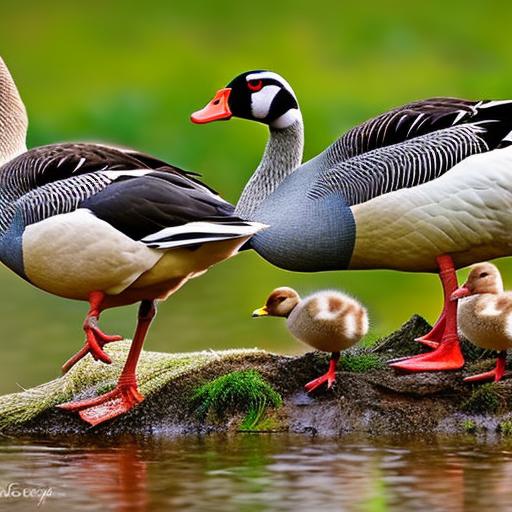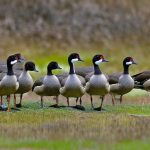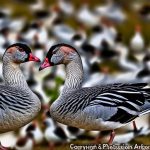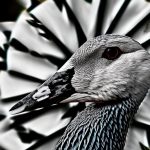Raising buff geese with ducks has become a popular choice among farmers and homesteaders. This unique combination offers a range of benefits, from natural pest control to increased egg production. By understanding the temperament of buff geese and ducks, providing appropriate housing and feeding, and managing flock dynamics, farmers can successfully raise these birds together. In this article, we will explore the various aspects of keeping buff geese with ducks and the rewards it brings.
Key Takeaways
- Keeping Buff Geese with Ducks can be a rewarding experience for farmers and homesteaders.
- Raising Buff Geese with Ducks can provide benefits such as pest control, fertilization, and meat and egg production.
- Understanding the temperament of Buff Geese and Ducks is important for managing flock dynamics and preventing aggression.
- Housing requirements for Buff Geese and Ducks should include adequate space, shelter, and access to water.
- Feeding Buff Geese and Ducks a balanced diet is crucial for their health and productivity.
Benefits of Raising Buff Geese with Ducks
One of the main benefits of raising buff geese with ducks is natural pest control. Geese are known for their ability to graze on grass and weeds, which helps keep the pasture clean and free from unwanted plants. Ducks, on the other hand, are excellent at foraging in water and eating insects and snails. By combining these two species, farmers can effectively control pests in both land and water areas.
Another benefit is the complementary foraging habits of buff geese and ducks. Geese are primarily grazers, while ducks are dabblers. This means that geese prefer to eat grass and plants on land, while ducks enjoy dabbling in shallow water to find food. By allowing them to forage together, farmers can maximize their grazing potential and ensure that both species have access to their preferred food sources.
In addition to pest control and complementary foraging habits, raising buff geese with ducks can also lead to increased egg production. Geese are known for their large eggs, while ducks are prolific layers. By having both species in the flock, farmers can enjoy a variety of egg sizes and colors. This can be appealing to customers who are looking for unique eggs or those who prefer a mix of sizes for different culinary purposes.
Furthermore, buff geese and ducks are dual-purpose meat birds. Geese are known for their flavorful meat, while ducks are prized for their tender and succulent meat. By raising both species together, farmers can offer a diverse range of meat options to their customers. This can be particularly advantageous for those who sell directly to consumers or participate in farmers markets.
Understanding the Temperament of Buff Geese and Ducks
It is important to understand the differences in behavior between buff geese and ducks when raising them together. Geese are generally more territorial and protective, while ducks are more social and adaptable. When introducing them to each other, it is best to do so gradually and in a controlled environment. This can help minimize any potential aggression or stress.
To manage aggression between buff geese and ducks, it is important to provide enough space for each species. Geese require more space than ducks, as they are larger birds and need room to roam. Providing separate areas for feeding and nesting can also help reduce competition and aggression. Additionally, providing plenty of hiding spots and visual barriers can help ducks feel safe and secure.
Housing Requirements for Buff Geese and Ducks
When it comes to housing requirements, both buff geese and ducks have similar needs. A spacious and secure enclosure is essential to protect them from predators and provide them with a comfortable living environment. The size of the housing will depend on the number of birds being kept, but as a general rule, each bird should have at least 10 square feet of space.
Nesting requirements for buff geese and ducks differ slightly. Geese prefer to nest on the ground, so providing a soft bedding material such as straw or hay is important. Ducks, on the other hand, prefer nesting boxes or secluded areas where they can lay their eggs. Providing nesting boxes with straw or shavings can encourage ducks to lay their eggs in a designated area.
Water is an essential element for both buff geese and ducks. They require access to clean water for drinking, bathing, and swimming. A shallow pool or pond is ideal for ducks, while geese can also benefit from a larger body of water. It is important to regularly clean and refill the water source to ensure the birds have access to fresh water at all times.
Feeding Buff Geese and Ducks
Buff geese and ducks have different dietary needs, but it is possible to provide a balanced diet for both species. Geese are primarily grazers and require a diet rich in grass and plants. Ducks, on the other hand, require a diet that includes a mix of grains, vegetables, and protein sources.
To provide a balanced diet for buff geese and ducks, it is important to offer a variety of food options. This can include fresh grass, weeds, and vegetables for the geese, as well as a commercial poultry feed that is specifically formulated for ducks. Supplementing their diet with protein sources such as mealworms or fish can also be beneficial.
Health Considerations for Buff Geese and Ducks

When raising buff geese and ducks together, it is important to be aware of common health issues that may affect them. Both species are susceptible to respiratory infections, parasites, and foot problems. Regular health checks and preventative measures such as vaccinations and deworming can help keep the birds healthy.
If any health issues arise, it is important to consult a veterinarian who specializes in poultry. They can provide guidance on treatment options and help prevent the spread of diseases within the flock. It is also important to quarantine any sick birds to prevent further contamination.
Breeding Buff Geese and Ducks
Breeding buff geese and ducks can be a rewarding experience. When selecting breeding stock, it is important to choose healthy birds with desirable traits such as good egg production or meat quality. Providing appropriate nesting areas and ensuring that the birds have access to clean water can help encourage breeding behavior.
Incubation and hatching requirements differ slightly between buff geese and ducks. Geese typically lay a small number of eggs and incubate them for around 30 days. Ducks, on the other hand, lay larger clutches of eggs and incubate them for around 28 days. Providing a safe and warm environment for the eggs during incubation is essential for successful hatching.
Caring for young birds involves providing them with appropriate feed, water, and shelter. It is important to monitor their growth and development to ensure they are healthy and thriving. Providing a separate area for the young birds can also help protect them from potential aggression from adult birds.
Managing Flock Dynamics Between Buff Geese and Ducks
Managing flock dynamics between buff geese and ducks requires careful observation and intervention if necessary. It is important to prevent bullying and aggression within the flock, as this can lead to stress and injury. Providing enough space, food, and water for each bird can help minimize competition and reduce the likelihood of aggression.
Tips for managing a mixed flock include providing multiple feeding and watering stations to prevent overcrowding. It is also important to monitor the behavior of individual birds and intervene if any signs of aggression or bullying are observed. Separating birds into smaller groups if necessary can also help manage flock dynamics and reduce stress.
Selling Buff Geese and Duck Products
Raising buff geese with ducks can provide opportunities for selling eggs and meat products. Marketing options for eggs include selling them directly to consumers, participating in farmers markets, or supplying local restaurants or bakeries. Pricing products will depend on factors such as production costs, market demand, and competition.
When selling meat products, it is important to comply with legal considerations such as obtaining the necessary permits or licenses. This may vary depending on the location and regulations in place. It is also important to ensure that the meat products are processed in a safe and sanitary manner to maintain quality and prevent contamination.
The Rewards of Keeping Buff Geese with Ducks
Keeping buff geese with ducks offers a range of benefits, from natural pest control to increased egg production and dual-purpose meat birds. By understanding the temperament of buff geese and ducks, providing appropriate housing and feeding, and managing flock dynamics, farmers can successfully raise these birds together. The rewards of keeping buff geese with ducks are not only practical but also personal. Many farmers and homesteaders have shared their positive experiences with raising these birds together, highlighting the joy and satisfaction it brings. With careful planning and management, anyone can enjoy the rewards of keeping buff geese with ducks on their farm or homestead.
If you’re interested in keeping buff geese with ducks, you may find this article on Poultry Wizard helpful. It provides valuable insights on how to care for goslings, including tips on feeding, housing, and general care. Additionally, if you’re looking to create a suitable living environment for your feathered friends, Poultry Wizard also offers articles on insulating a chicken coop and large chicken coop ideas. Check out these resources to ensure the well-being and comfort of your buff geese and ducks. (source)
FAQs
What are buff geese?
Buff geese are a breed of domestic geese that are known for their buff-colored feathers and gentle temperament. They are commonly raised for meat, eggs, and as ornamental birds.
What are ducks?
Ducks are a type of waterfowl that are commonly raised for meat, eggs, and as pets. They come in a variety of breeds and sizes, and are known for their webbed feet and waterproof feathers.
Can buff geese and ducks be kept together?
Yes, buff geese and ducks can be kept together as long as they are provided with adequate space, food, and water. However, it is important to note that geese are generally larger and more aggressive than ducks, so it is important to monitor their interactions.
What should I feed my buff geese and ducks?
Buff geese and ducks should be fed a balanced diet that includes a mix of grains, vegetables, and protein. Commercial poultry feed can also be used as a supplement. It is important to provide fresh water at all times.
How much space do buff geese and ducks need?
Buff geese and ducks need a minimum of 4 square feet of indoor space per bird, and at least 10 square feet of outdoor space per bird. However, more space is always better, especially if you plan to keep a large flock.
What kind of housing do buff geese and ducks need?
Buff geese and ducks need a secure, predator-proof shelter that is well-ventilated and provides protection from the elements. They also need access to a clean, dry area for nesting and sleeping.
What are some common health issues for buff geese and ducks?
Common health issues for buff geese and ducks include respiratory infections, parasites, and injuries from predators or other birds. It is important to provide regular veterinary care and to keep their living area clean and dry to prevent the spread of disease.
Meet Walter, the feathered-friend fanatic of Florida! Nestled in the sunshine state, Walter struts through life with his feathered companions, clucking his way to happiness. With a coop that’s fancier than a five-star hotel, he’s the Don Juan of the chicken world. When he’s not teaching his hens to do the cha-cha, you’ll find him in a heated debate with his prized rooster, Sir Clucks-a-Lot. Walter’s poultry passion is no yolk; he’s the sunny-side-up guy you never knew you needed in your flock of friends!







